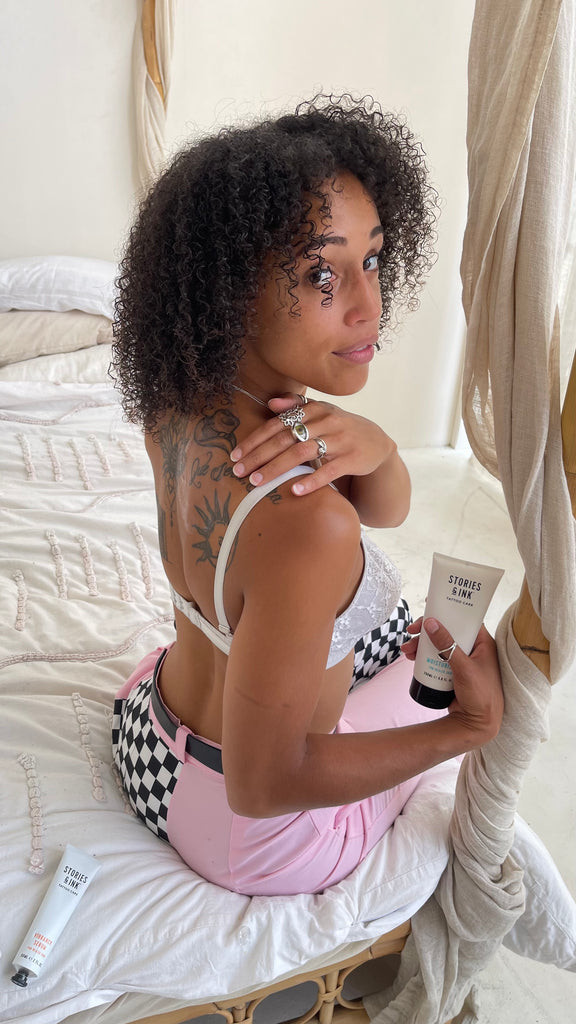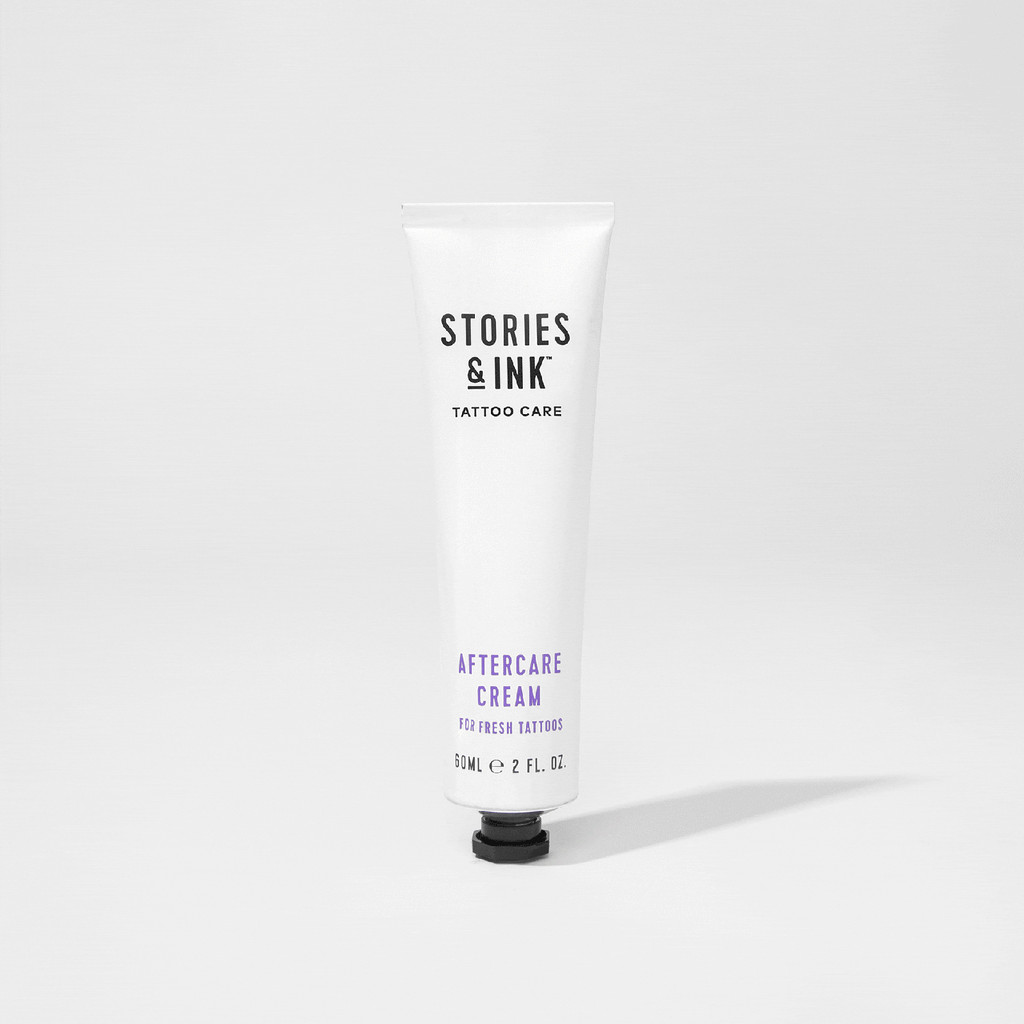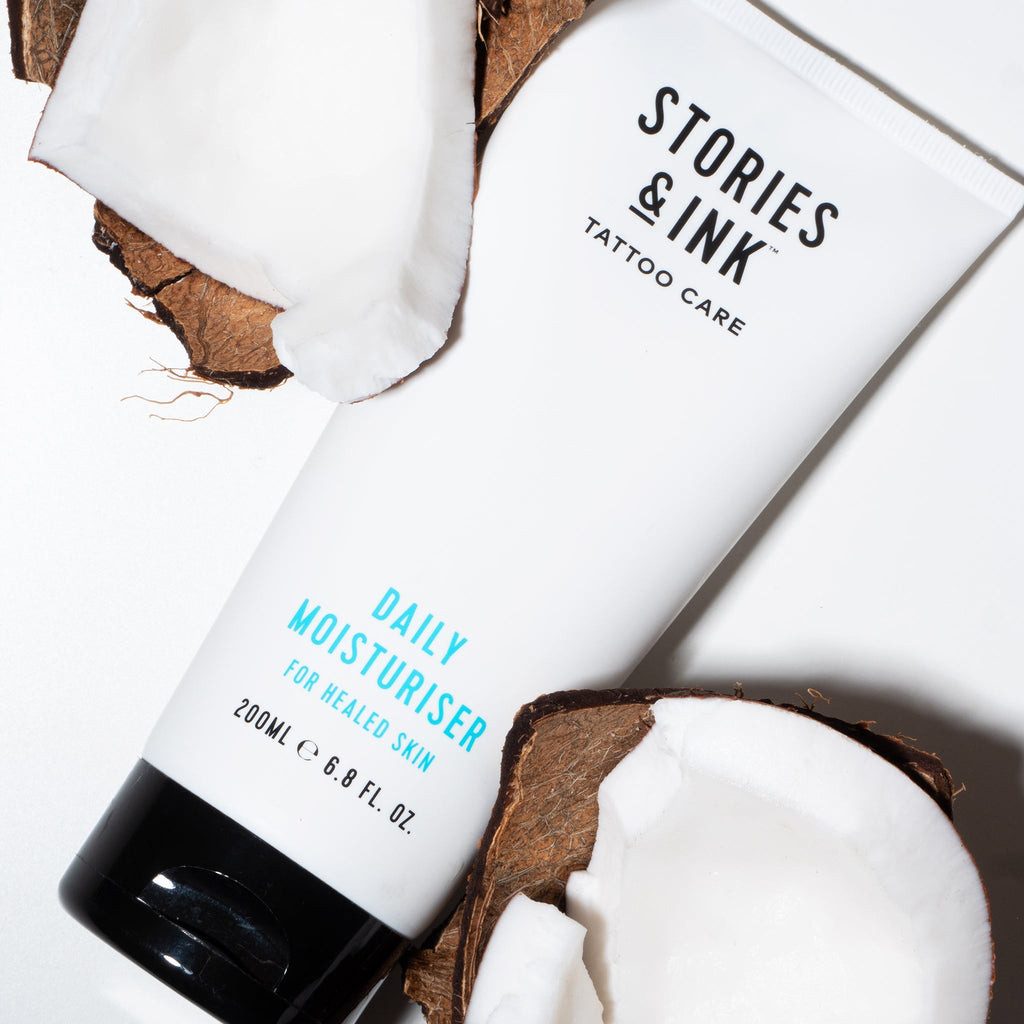Is your new tattoo itching and driving you crazy? Tattoo itching is a very common part of the tattoo healing journey. At tattooat.com, we understand how irritating tattoo itching can be, and we’re here to help! We’ll explore the causes of itching, how long it typically lasts, and, most importantly, how to find relief so you can enjoy your beautiful new ink. Think of us as your trusted resource for tattoo aftercare, tattoo healing, and everything tattoo-related.
1. Understanding Tattoo Itching: Why Does It Happen?
Tattoo itching is the annoying urge to scratch the skin around a new or old tattoo. It’s a sign that your body is hard at work healing. The level of itchiness can vary from a mild tickle to an intense, maddening sensation.
What Causes Tattoo Itching?
Several factors contribute to tattoo itching:
-
The Healing Process: When you get a tattoo, the needles create tiny punctures in your skin. As your skin heals, it goes through stages like scabbing, peeling, and regeneration. These stages naturally cause itching.
-
The Immune Response: Your body recognizes tattoo ink as a foreign substance. As your immune system responds, it releases histamine, a chemical that can cause itching, redness, and inflammation.
-
Dry Skin: Dry skin is a major trigger for itching. When the tattooed area lacks moisture, it becomes dry, tight, and irritated, leading to that familiar itch.
-
Allergic Reactions: In some cases, tattoo itching can be a sign of an allergic reaction to the tattoo ink itself or the aftercare products you’re using. Allergic reactions can cause intense itching, redness, swelling, and even hives.
-
Infection: Although less common, an infected tattoo can also cause itching. If your tattoo is intensely itchy, red, swollen, and oozing pus, seek medical attention immediately.
The Healing Timeline and Itching
The itching timeline can vary depending on individual factors, but here’s a general idea:
- Week 1: The initial week after getting your tattoo is often the most intense. The tattoo is fresh, and the skin is actively trying to heal. Scabbing typically begins during this week, which can make the itching worse.
- Week 2-3: As the scabs begin to flake off, the itching might become even more pronounced. It’s crucial to resist the urge to pick or scratch at the scabs.
- Week 4 and Beyond: By week four, the outer layers of skin should be mostly healed, and the itching should subside significantly. However, some people may experience occasional itching for several weeks or even months as the deeper layers of skin continue to regenerate.
 Woman applying tattoo aftercare cream
Woman applying tattoo aftercare cream
Moisturizing regularly helps keep the skin hydrated, reducing dryness and itchiness. Keep your tattoo happy and itch-free with proper hydration.
2. How Long Will My Tattoo Itch? The Waiting Game
The million-dollar question: How long will this infernal itching last? Typically, tattoo itching lasts for one to three weeks. But everyone’s body heals at its own pace.
Factors Affecting Itching Duration
Several factors can influence how long your tattoo will itch:
- Tattoo Size and Placement: Larger tattoos and those located in areas with more nerve endings (like ribs or ankles) may itch more and for longer.
- Your Skin Type: People with sensitive skin or pre-existing skin conditions like eczema may experience more intense and prolonged itching.
- Aftercare Routine: Proper aftercare is crucial for minimizing itching. Consistent cleaning and moisturizing can keep the skin hydrated and promote faster healing.
- Overall Health: Your immune system plays a vital role in the healing process. A strong immune system can help speed up healing and reduce itching.
3. Tattoo Itching and Raised: When to Worry
Sometimes, tattoo itching can be accompanied by a raised appearance. When should you be concerned?
Potential Causes of Raised and Itchy Tattoos
- Allergic Reactions: Allergic reactions to tattoo ink or aftercare products can cause the tattoo to become raised, red, and intensely itchy. Certain ink colors, particularly red, are more likely to cause allergic reactions.
- Infection: An infected tattoo can also appear raised, swollen, and tender. You may also notice pus or drainage.
- Scarring: In some cases, a raised tattoo can be a sign of hypertrophic scarring or keloid formation. These types of scars can develop if the skin is damaged during the tattooing process or if the tattoo is not properly cared for.
- Sarcoidosis: Rarely, a raised and itchy tattoo can be a sign of sarcoidosis, an inflammatory disease that can affect the skin and other organs.
When to Seek Medical Attention
If you experience any of the following symptoms, consult a healthcare professional immediately:
- Severe Pain: Intense pain that doesn’t subside with over-the-counter pain relievers.
- Excessive Swelling: Significant swelling around the tattoo that spreads beyond the tattooed area.
- Pus or Drainage: Any discharge of pus or fluid from the tattoo.
- Fever: A fever of 100.4°F (38°C) or higher.
- Hives or Rash: A widespread rash or hives that develop after getting the tattoo.
- Difficulty Breathing: Difficulty breathing or swallowing, which could be a sign of a severe allergic reaction.
4. Soothing the Itch: Safe and Effective Strategies
Okay, enough about the causes and timelines. How do you make the itching stop?
The Golden Rule: Resist Scratching!
I know, it’s easier said than done. But scratching is the worst thing you can do for an itchy tattoo. It can:
- Introduce Bacteria: Your fingernails harbor bacteria that can lead to infection.
- Damage the Skin: Scratching can tear the delicate healing skin, prolonging the healing process and increasing the risk of scarring.
- Cause Ink Loss: Vigorous scratching can dislodge tattoo ink, leading to patchy or faded tattoos.
Gentle Alternatives to Scratching
- Patting: Gently pat or tap the itchy area with your fingertips. This can provide some relief without damaging the skin.
- Cold Compresses: Apply a cold compress or ice pack wrapped in a clean cloth to the itchy area for 10-15 minutes at a time. The cold can help numb the nerves and reduce inflammation.
- Light Slapping: Very lightly slapping the tattoo might provide brief relief, but avoid doing it forcefully.
Essential Aftercare Practices
- Keep it Clean: Gently wash your tattoo twice a day with mild, fragrance-free soap and lukewarm water. Pat it dry with a clean paper towel.
- Moisturize Regularly: Apply a thin layer of fragrance-free, hypoallergenic tattoo aftercare lotion or ointment several times a day. Look for products containing ingredients like shea butter, cocoa butter, or vitamin E.
- Wear Loose Clothing: Avoid tight clothing that can rub against the tattoo and cause irritation. Opt for loose, breathable fabrics like cotton.
Topical Treatments for Itching Relief
- Tattoo Aftercare Balms: Many tattoo aftercare balms contain ingredients that can help soothe itching and promote healing. Look for balms with natural ingredients like calendula, chamomile, or lavender.
- Colloidal Oatmeal: Colloidal oatmeal has anti-inflammatory and anti-itching properties. You can find it in creams, lotions, or bath soaks.
- Aloe Vera: Aloe vera gel can help soothe irritated skin and reduce inflammation. Make sure to use pure aloe vera gel without any added fragrances or chemicals.
Oral Medications for Severe Itching
- Antihistamines: Over-the-counter antihistamines like Benadryl or Zyrtec can help reduce itching caused by histamine release. However, be aware that some antihistamines can cause drowsiness.
- Consult a Doctor: If your itching is severe and doesn’t respond to other treatments, consult a doctor. They may prescribe a stronger antihistamine or a topical corticosteroid cream.
 Stories & Ink tattoo aftercare cream
Stories & Ink tattoo aftercare cream
The Stories & Ink Aftercare Cream is hypoallergenic, fragrance-free, 100% vegan, and cruelty-free. Treat your tattoo to the best with this aftercare cream.
5. Can I Slap My New Tattoo? A Risky Move
While a light slap might provide momentary relief, it’s generally not recommended. Slapping can damage the healing skin and potentially lead to complications.
Potential Risks of Slapping
- Skin Irritation: Slapping can further irritate the already sensitive skin.
- Inflammation: It can increase inflammation, prolonging the healing process.
- Scarring: Forceful slapping could potentially contribute to scarring.
Safer Alternatives
Stick to patting, cold compresses, or topical treatments for safer itching relief.
6. What Happens If I Scratch My Tattoo? The Consequences
Scratching is a big no-no. But what if you accidentally give in to the urge?
Potential Consequences of Scratching
- Infection: Introducing bacteria can lead to a painful and potentially serious infection.
- Scarring: Scratching can damage the skin and increase the risk of permanent scarring.
- Ink Loss: It can dislodge tattoo ink, resulting in a faded or uneven tattoo.
- Delayed Healing: Scratching disrupts the healing process, prolonging the itching and discomfort.
If You’ve Scratched Your Tattoo
- Assess the Damage: Check for any signs of infection, such as redness, swelling, or pus.
- Clean the Area: Gently wash the area with mild soap and water.
- Apply Aftercare Lotion: Apply a thin layer of tattoo aftercare lotion or ointment.
- Monitor for Infection: Keep a close eye on the area for any signs of infection. If you suspect an infection, seek medical attention immediately.
7. What to Use on Your New Tattoo: Aftercare Essentials
Choosing the right products for your new tattoo is crucial for proper healing and minimizing itching.
Recommended Products
- Mild, Fragrance-Free Soap: Use a gentle soap like Cetaphil or Dove to cleanse the tattoo.
- Tattoo Aftercare Lotion or Ointment: Look for products specifically designed for tattoo aftercare. These products are typically fragrance-free, hypoallergenic, and contain ingredients that promote healing.
- Colloidal Oatmeal Cream: Colloidal oatmeal can help soothe itching and reduce inflammation.
- Aloe Vera Gel: Pure aloe vera gel can help soothe irritated skin.
Ingredients to Avoid
- Fragrances: Fragrances can irritate the skin and cause allergic reactions.
- Alcohol: Alcohol can dry out the skin and delay healing.
- Petroleum-Based Products: Petroleum-based products can clog pores and trap bacteria.
- Harsh Chemicals: Avoid products containing harsh chemicals or dyes.
8. What to Use on Old Tattoos: Long-Term Care
Old tattoos can also itch due to dryness, allergies, or environmental factors.
Causes of Itching in Old Tattoos
- Dry Skin: Dry skin is a common cause of itching in old tattoos.
- Allergies: Allergic reactions to detergents, lotions, or other products can cause itching.
- Sun Exposure: Sun exposure can dry out the skin and irritate the tattoo.
- Changes in Weather: Changes in temperature or humidity can also contribute to itching.
Tips for Relieving Itching in Old Tattoos
- Moisturize Regularly: Apply a fragrance-free, hypoallergenic lotion or tattoo-specific moisturizer daily.
- Avoid Harsh Chemicals: Avoid using scented lotions, perfumes, or products containing alcohol on your tattoo.
- Protect from Sun Exposure: Wear sunscreen with a high SPF when spending time outdoors.
- Consider Antihistamines: If your itching is persistent and severe, consult a doctor about taking over-the-counter antihistamines.
- Stay Hydrated: Drinking plenty of water can help keep your skin hydrated from the inside out.
 Stories & Ink Daily Moisturiser
Stories & Ink Daily Moisturiser
The Stories & Ink Daily Moisturizer keeps tattoos hydrated and is appropriate for all skin types. Keep your tattoos looking vibrant and feeling great with this daily moisturizer.
9. University Research on Tattoo Aftercare
According to research from Portland State University’s Art Department, in July 2023, proper hydration and moisturizing are key to reducing tattoo itching. The study highlighted that tattoos in Portland, Oregon, known for its vibrant tattoo culture, often heal better with consistent aftercare due to the city’s generally mild climate. Additionally, the research emphasized the importance of using fragrance-free and hypoallergenic products to avoid allergic reactions.
10. Exploring Tattoo Styles and Inspiration on Tattooat.com
Now that you know how to manage the itch, let’s explore the exciting world of tattoo styles! At tattooat.com, we have a vast collection of designs and inspiration to help you find your next piece.
Popular Tattoo Styles
- Traditional: Bold lines and classic imagery.
- Neo-Traditional: A modern take on traditional styles with brighter colors and intricate details.
- Realism: Lifelike depictions of people, animals, or objects.
- Watercolor: Soft, flowing colors that mimic watercolor paintings.
- Geometric: Precise shapes and patterns.
- Blackwork: Bold black ink designs.
- Minimalist: Simple, understated designs.
Finding Inspiration on Tattooat.com
- Extensive Design Library: Browse thousands of tattoo designs in various styles and themes.
- Artist Spotlights: Discover talented tattoo artists and their unique styles.
- Style Guides: Learn about different tattoo styles and their histories.
- Community Forum: Connect with other tattoo enthusiasts and share your ideas.
FAQ: Your Tattoo Itching Questions Answered
- Why is my new tattoo itching so much?
- New tattoos itch due to the skin healing, scabbing, and the body’s immune response to the ink.
- Is it normal for an old tattoo to start itching?
- Yes, old tattoos can itch due to dry skin, allergies, or environmental factors.
- What’s the best way to relieve tattoo itching?
- Moisturize regularly, avoid scratching, use cold compresses, and wear loose clothing.
- Can I use regular lotion on my new tattoo?
- It’s best to use fragrance-free, hypoallergenic tattoo aftercare lotion.
- When should I see a doctor about my itchy tattoo?
- See a doctor if you have severe pain, excessive swelling, pus, fever, hives, or difficulty breathing.
- Are certain tattoo ink colors more likely to cause itching?
- Yes, red ink is more likely to cause allergic reactions and itching.
- Can sun exposure make my tattoo itch?
- Yes, sun exposure can dry out the skin and irritate the tattoo, leading to itching.
- Will scratching my tattoo ruin it?
- Yes, scratching can cause infection, scarring, ink loss, and delayed healing.
- Can I take antihistamines for tattoo itching?
- Yes, over-the-counter antihistamines can help reduce itching.
- How can I find a reputable tattoo artist?
- Check online reviews, ask for recommendations, and view the artist’s portfolio on tattooat.com.
Ready to Explore the World of Tattoos?
Say goodbye to dry, itchy, and faded ink and hello to soft, nourished, and brighter tattoos! At tattooat.com, we’re dedicated to providing you with the resources and inspiration you need to make your tattoo dreams a reality.
Call to Action
- Discover Designs: Explore our extensive library of tattoo designs and find the perfect inspiration for your next piece.
- Find an Artist: Connect with talented tattoo artists in the USA and find the perfect match for your style.
- Learn More: Read our in-depth articles and guides on tattoo aftercare, styles, and trends.
- Contact Us: Have questions or need assistance? Contact our friendly team for personalized support.
Address: 1825 SW Broadway, Portland, OR 97201, United States
Phone: +1 (503) 725-3000
Website: tattooat.com
Let tattooat.com be your trusted companion on your tattoo journey.